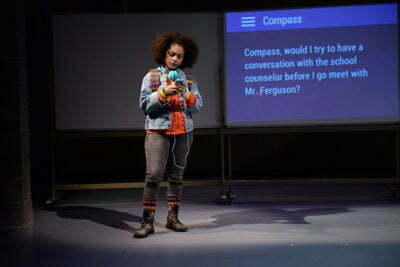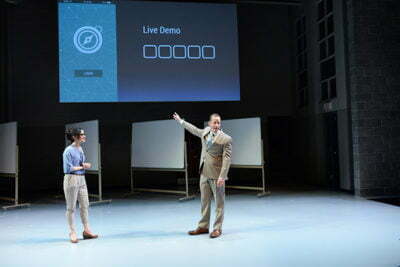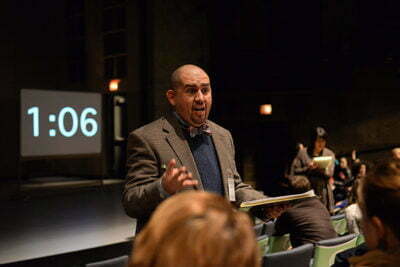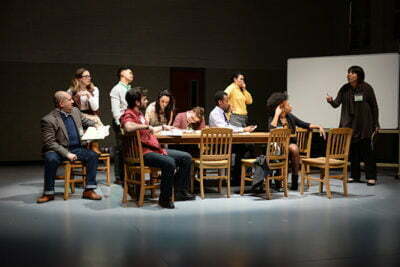The Compass
Directed and Devised by Michael Rohd
Produced by Steppenwolf Theatre Company
Determinism? There’s an App for That
The terms “audience participation” and “group discussion” tend to get bad reactions from theatre-goers, but when used by a knowledgeable director for the right purpose, they can have rewarding results. The Compass, a new show devised by Michald Rohd for Steppenwolf’s Young Adult series, asks the audience to directly grapple with such thorny problems as determinism, and whether free will is relevant in the criminal justice system. With the guidance of well-trained actor-facilitators, the audience become jurors in a fascinating case set a few years in the future. The issues raised are fodder for passionate discussion, and the play itself is the sort of strong story-telling which inspires young people to see the possibilities in using art to explore political issues.

Ada (Cruz Gonzalez-Cadal), a developer, and her entrepreneur partner (Tim Hopper), have launched an app called Compass. This program mines all the information a user enters in social media accounts, and can be used to make predictions about what a person would do in any given situation. Not “should” or “will” do, the entrepreneur is careful to point out, but “would.” They market it as a way to remove the stress from making decisions. Why go through all the trouble of thinking something out and agonizing over uncertainties, trade-offs, and missed opportunities, when you have a device that tells you what decision you would inevitably make anyway? It not only saves time, it saves emotional energy. Best of all, Compass can be linked to your friends’ accounts and celebrities’ public profiles, so you can learn what other people would do in your place, as well, and what they perceive you would do.

Marjan (Ariana Burks), the teenage girl on trial, used Compass to arrive at her decision to call in a fake bomb threat to her school. The result was the usual chaos: wasted police resources which could have been used on actual emergencies, wasted resources for a school system that was already stretched to the breaking point, unexpected disruption for working parents of special needs students who couldn’t simply go home, and so forth. However, Marjan is no mere prankster. Over the course of her trial, we see that she is a smart young activist who has become frustrated that her complaints about the school’s safety have been ignored. To shake the adults out of their complacency, Marjan wrote a detailed guide to smuggling guns into the building, which she claims is already common knowledge among the students, anyway, and happens frequently. Naturally, her teacher (Hopper) refused to publish it, so Marjan put it online, figuring the other students would be mature enough to understand her point, and grown-ups would finally address the issue. Things did not go as she hoped.

Marjan is now facing a mandatory minimum sentence of two years in an adult prison if we convict her. Her defense is that she would not have made her decision if she had not become so reliant on Compass. The prosecutor says that’s nonsense. From a legal perspective, Marjan would clearly be guilty if not for the Compass issue, and her choice of defense is a long-shot, but the moral justification for the crime itself is arguable. As for Compass, it’s clearly a way to get people thinking about the process by which they make decisions, and how much responsibility we have for that. It’s an unsettling subject for people of any age, and one well worth exploring.
 The audience is divided into ten sections, and together, each section makes up a single juror. Throughout, the facilitators give us a few minutes to discuss what we’ve seen, and that time limit keeps the debate much more focused than the usual audience talk-backs. The high quality of the acting also inspires the audience to take its role seriously; Burks is completely believable, and the facilitators balance a fine line between parody and earnestness. At the performance I attended, the final vote was close, and the arguments from both the audience members and their facilitator proxies were intense, but respectful and thought-provoking. Though Compass is fictional, it is true that people have theoretical control over the algorithms which determine what information they receive online, but they usually fail to exercise that control. This is a commendable instance in which a youth theatre show has made a difficult, complex question understandable and relevant to teens without insulting their intelligence, or ours. The deliberations may have different results at the high school showings, but the balance of the viewpoints presented is sure to keep up the quality of the discourse. There are a few public performances remaining, so older people have the chance to weigh in, too.
The audience is divided into ten sections, and together, each section makes up a single juror. Throughout, the facilitators give us a few minutes to discuss what we’ve seen, and that time limit keeps the debate much more focused than the usual audience talk-backs. The high quality of the acting also inspires the audience to take its role seriously; Burks is completely believable, and the facilitators balance a fine line between parody and earnestness. At the performance I attended, the final vote was close, and the arguments from both the audience members and their facilitator proxies were intense, but respectful and thought-provoking. Though Compass is fictional, it is true that people have theoretical control over the algorithms which determine what information they receive online, but they usually fail to exercise that control. This is a commendable instance in which a youth theatre show has made a difficult, complex question understandable and relevant to teens without insulting their intelligence, or ours. The deliberations may have different results at the high school showings, but the balance of the viewpoints presented is sure to keep up the quality of the discourse. There are a few public performances remaining, so older people have the chance to weigh in, too.
Highly Recommended
Jacob Davis
[email protected]
Reviewed February 27, 2016
For more information, see The Compass’s page on Theatre in Chicago.
Playing in the Downstairs Theatre at Steppenwolf, 1650 N Halsted, Chicago. Tickets for public performances are $20, with discounts for students with ID. To order, call 312-335-1560 or visit Steppenwolf.org. Public performances are March 4 at 7:30 pm, March 5 at 3:00 pm, March 11 at 7:30 pm, and March 12 at 3:00 pm. Running time is ninety minutes. Recommended for ages 12 and up.

